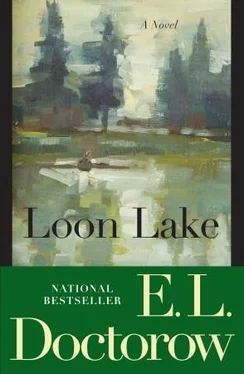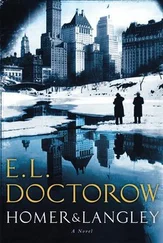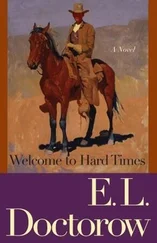I went through the woods to Clara’s cabin and found her luggage standing just inside the front door. There were three bags and a hatbox. I got all of them under my arms or hanging from my hands, and struggled up the hill to the garage on the far side of the tennis court. This was the old Loon Lake stable. It housed five cars. In the last stall was Mrs. Bennett’s car, a rarely used gray two-door Mercedes-Benz with a canvas top and spare tires in the front fender wells. I looked for the ignition key where Mr. Penfield had told me to — in the bud vase on the right-hand side in the back. Yes. I packed the bags in the trunk, which was not large, and put the hatbox in the back seat. I turned on the map light and by its glow learned the European-style shifting. There were four gears, and a diagram of their positions was imprinted on the mother-of-pearl knob of the floor shift. The dust on the seat cracked under me. I flicked at it with a chamois cloth. The odometer showed less than ten thousand miles. Then I saw it was not even miles, it was kilometers. Lucinda Bennett had told Mr. Penfield it was a 1933 model. Clearly, her interest in machines did not include cars. The license plate was up to date, however.
I swung open the doors as quietly as I could and got in and started the engine. I backed out. It was a noisy car — I later found it was only forty horsepower — and I drove it the few yards to the gas pump shushing it as if it were a baby. I filled it with Mr. Bennett’s personal ethyl and then I gave each tire a shot of his air. I was wearing his knickers and argyle sweater and brown-and-white saddle shoes. I tried not to get them dirty.
I was ready to go. I waited behind the wheel. It was a snug little car. The seats were gray leather. The doors opened front to back. I went over some road maps. I sat there and got the feeling of the car and worried about driving it well, and wondered where to go and what I would say to Clara Lukaćs and what she would say to me. I worried that people seeing me behind the wheel would think I was rich. I didn’t once reflect on the lately peculiar conforming of life to my desires. I didn’t think of Lucinda Bennett’s generosity or despair, or Mr. Penfield’s, nor even reach the most obvious conclusion; that I was leaving Loon Lake in somewhat better condition than I had come. Calculating, heedless, and without gratitude, I accepted every circumstance that had put me there, only gunning my mind to the future, wanting more, expecting more, too intent on what was ahead to sit back and give thanks or to laugh or to feel bad.
I peered through the windshield. I watched the trees shaking in the night wind. I unlatched the canvas top and pushed it back a bit and looked at the stars, which seemed to shimmer and blur as if the wind were blowing through them.
Eventually she got there, hurrying along with Mr. Penfield holding her arm, while she held her gown off the ground to keep from tripping. She wore a fur jacket over the gown. He opened the door, but before she could slide in, he grabbed her and hugged her and started to gabble something. I saw all this with their heads cut off. I saw her push him away. “War-rin, please!” she said.
Then she was in the car beside me, in an atmosphere of fur and cold air, and she slammed the door. Penfield peered in, then ran around the front of the car to the driver’s side. I started the engine and threw the toggle switch for the headlights. I adjusted the throttle. I rolled down my window and he thrust something in my hand, a wad of bills. “I wish it was more,” he said. He gave us advice of many kinds, cheerful assurances, warnings about the road, the weather, appeals to keep in touch, phone numbers on bits of paper, promises, vows, thrown kisses — and to this fitful love song I put the car into first, and off we lurched down the road.
We were taking what was called the back road, away from the main house; there was a sudden bend, and Mr. Penfield, waving in the night in his black tie, veered out of my rear view.
I leaned forward, attentive to the clutching, and gradually, as we made our way bumping and sliding over this gravelly unpaved circuit through the Bennett preserve, I got the hang of it. We drove for quite a while. I glanced at her. In the glow of the dashboard I saw her young face.
I think now of that long drive down through the forest to the state road, dogs appearing from nowhere to gallop yelping alongside, their breath sounding metallic, like the engine; and disappearing just as suddenly, then again one or two of them, then for a mile a beating pack; and she saying nothing, only holding the leather strap by her window, looking out to the side, to the front, her eyes following them tracking them, the youth of her illuminated in the low light. Finally we outdistanced them all.
She sat back in her seat. She took a cigarette out of her purse and lit it.
“What do you think he’ll do when he finds you gone?” I said.
“An interesting question,” she said.
And so we descended from Loon Lake, Clara’s clear eyes fixed on the farthest probe of the headlights, and I looking at her every other moment, in her composure of total attention, going with the ride.
Every morning she swept the dirt path outside the monastery wall. She always wore the same thing, a simple kimono and those wooden slippers, you know? She was fifteen or sixteen years old but her hair was cut in the bowl cut of young children. Hair as black as night. She never smiled, but when she glanced at me there was such a flash of recognition from my soul that I went weak with joy.
Oh, Warren.
I used to wake up before dawn and do my chores and manage always to be at the gate when the sun rose and she came to do hers. She was the daughter of some working family down the street. They sweep the streets there with straw brooms. The unpaved streets. They sweep the dirt, compose it. They compose everything, they pick the fallen leaves one at a time.
How did you get to her?
I wish you wouldn’t phrase it that way, Lucinda. We knew each other on sight. We had to. My Japanese was less than rudimentary. Her English nonexistent. Only the upper classes studied English. It was a great social distinction to know English. A workman’s daughter couldn’t aspire to that.
Light me a cigarette, will you?
I have in my life just three times seen a face in dark light, at dusk or dawn or against a white pillow, in which there is a recognizably perfect perception of the world, some matched reflection of the world in her eye’s light as terrifying and beautiful in equal measure. Am I coherent?
A moral light? Is that what you mean?
She lives through her fear to her curiosity, there is a stillness of apprehension, like an animal’s stillness of perfect apprehension of its predator, and it is gallantry to break the heart.
I wish we had known each other when we were young.
Her father and several uncles made up a delegation to complain about my conduct to the monastery officials, who of course did not have to be told. I had broken every rule in the book. At the moment both sides gathered to come down on us we slipped away together and took the train to Tokyo. We found a room.
Is this when you became lovers?
I suppose so. I thought I could support us by teaching American customs and manners to Japanese businessmen. They wanted that. They were studying us intently. They listened to jazz and danced the Charleston. You’re not crying, are you?
It makes me sad. I know what happened.
I left the house one morning. I had an appointment to see someone at the U.S. embassy. It was a Saturday, the first day in September, 1923. As I walked down the street, I lost my balance but suddenly people everywhere were screaming. The streets were cracking open. I ran back, the city was falling down everywhere, I climbed over rubble, I saw her coming after me with her arms raised, the cobblestones heaved, the street broke open, it filled with water, I reached her and grabbed her hand just as the earth sank away and she fell in, she fell from my hands and where the earth had been there was a steaming lake. What is that up ahead, Lucinda? It looks very dark.
Читать дальше











